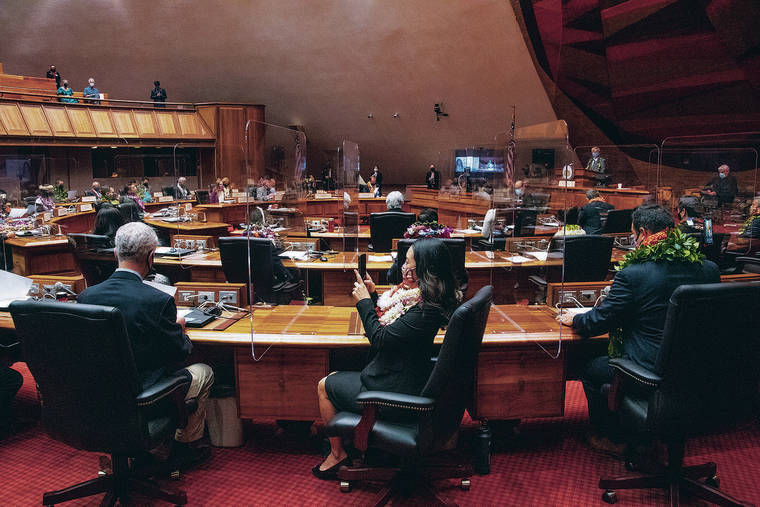With the 31st Hawaii State Legislature scheduled to adjourn Thursday, some lawmakers are already looking to the 2022 session to push ahead on issues that appear stalled this year, including raising the minimum wage, doing more on climate change and affordable housing, expanding broadband service, diversifying the isle economy and perhaps legalizing recreational marijuana.
There was plenty of discussion this session on a range of issues, many of them important to progressives. And some initiatives, such as legalizing recreational marijuana, got further through the Legislature than ever.
But the session began with the state in economic crisis from the COVID-19 pandemic and facing the possibility of furloughs and even layoffs for state workers, which would have made the nation’s worst unemployment rate even more dire.
So House Speaker Scott Saiki told his colleagues not to propose any new programs or expect more money for existing ones. The Senate had the same philosophy.
With the legislative session in its final days, legislators such as state Rep. Richard Onishi, (D, South Hilo-Keaau-Honuapo), chairman of the House Labor &Tourism Committee, has Saiki’s backing to already begin work on a new package of issues for next January, especially for the employed who are still struggling to get ahead.
The push comes with the hope the next legislative session will open with a much improved economy — and with the pressure that more needs to be done to impress voters before the 2022 elections.
Some legislators disagree their re-election campaigns will drive them to take more action than in the current session, but not state Sen. Stanley Chang, (D, Diamond Head-Kahala-Hawaii Kai), chairman of the Senate Housing Committee. Chang this year pushed over 60 bills to address the need for more affordable housing, including some bills that remained alive last week.
“When we face the voters in 2022, I, for one, hope we will have passed a significant program that will prove to the voters that I deserve to be re-elected,” Chang said. “I hope all of my colleagues will feel the urgency of climate change, of homelessness. … We will be held accountable by the voters. We need to earn their right to represent them election after election.”
This year’s session began like no other, with COVID-19 shuttering Hawaii’s red-hot tourism economy and the state looking at the possibility of a $1.4 billion deficit in each of the next four years.
“We were barely scraping by,” Onishi said. “At the beginning, tourism was zero. We had closed the state down. Hotels were closing. Tour companies were closing. We were worrying, ‘How do we feed people?’ We were very focused on how do we survive.”
Now, with the session ending, Onishi is looking at new ideas for next session, especially for so-called ALICE families, an acronym for asset limited, income constrained, employed.
ALICE families live above the federal poverty line, and raising the minimum wage of $10.10 per hour could help. But Onishi wants to consider wider-ranging issues, such as adding tourism fees that could eliminate the need for ALICE families to pay some taxes.
“I believe they could have better use of that money if it was in their pocket from the beginning,” Onishi said.
He expects senators and representatives to push bills addressing climate change, clean energy and legalizing recreational marijuana.
“Definitely they’re going to come up again, but how we move forward depends on the state of the economy,” Onishi said. “Those are great things to try to do. But in my personal mind, addressing the ALICE family issues are way more important. We’re not trying to take huge bites. We’re trying to be surgical about what needs to be done.”
State Sen. Chris Lee, (D, Hawaii Kai-Waimanalo-Kailua), chairman of the Senate Transportation Committee, agrees that helping ALICE families needs to be a priority for the next legislative session
“How do you support ALICE families and how do you create a better economic situation for the typical Hawaii family?” Lee asked. “A piece of that is raising the minimum wage and providing more affordable housing.”
While the focus of the current session was shoring up the economy, other topics received plenty of discussion, such as diversifying the economy, expanding broadband service to rural communities and helping local farmers make the state more self-sustaining when it comes to food.
“These discussions are not just something to talk about, but rather are turning into real, concrete policy proposals that are getting consideration and are actually moving,” Lee said. “Local food sustainability was once a nice idea in years past to now being a primary driver of discussion and turning into actual policy.”
“I know that we’re not going to change everything overnight,” Lee said. “But we have to try.”
Political analyst Neal Milner doubts that next year’s legislative session will end with significant changes.
“I’m a pessimist because there’s always blather about diversifying the economy and we won’t do anything with marijuana,” Milner said. “The norm of the Hawaii Legislature is not to move quickly.”
Colin Moore, a University of Hawaii political science associate professor and director of UH’s Public Policy Center, said progress on many of the issues that were bypassed this session will depend on how quickly Hawaii’s economy rebounds.
“People are still marginally employed, or working part time at their old jobs, and there’s more consumer debt,” Moore said. “For the state itself, a lot of its financial health will depend on the recovery of tourism.”
Moore said there may be more pressure on legislators next year, at least when it comes to diversifying the economy to be less reliant on tourism.
With the COVID-19 pandemic, he said, “People got a real look at life without tourism.”

